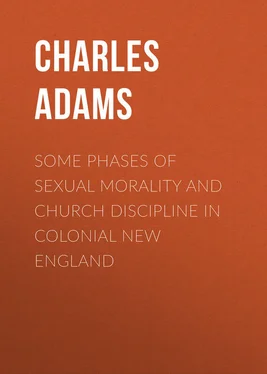Charles Adams - Some Phases of Sexual Morality and Church Discipline in Colonial New England
Здесь есть возможность читать онлайн «Charles Adams - Some Phases of Sexual Morality and Church Discipline in Colonial New England» — ознакомительный отрывок электронной книги совершенно бесплатно, а после прочтения отрывка купить полную версию. В некоторых случаях можно слушать аудио, скачать через торрент в формате fb2 и присутствует краткое содержание. Жанр: foreign_antique, foreign_prose, на английском языке. Описание произведения, (предисловие) а так же отзывы посетителей доступны на портале библиотеки ЛибКат.
- Название:Some Phases of Sexual Morality and Church Discipline in Colonial New England
- Автор:
- Жанр:
- Год:неизвестен
- ISBN:нет данных
- Рейтинг книги:4 / 5. Голосов: 1
-
Избранное:Добавить в избранное
- Отзывы:
-
Ваша оценка:
- 80
- 1
- 2
- 3
- 4
- 5
Some Phases of Sexual Morality and Church Discipline in Colonial New England: краткое содержание, описание и аннотация
Предлагаем к чтению аннотацию, описание, краткое содержание или предисловие (зависит от того, что написал сам автор книги «Some Phases of Sexual Morality and Church Discipline in Colonial New England»). Если вы не нашли необходимую информацию о книге — напишите в комментариях, мы постараемся отыскать её.
Some Phases of Sexual Morality and Church Discipline in Colonial New England — читать онлайн ознакомительный отрывок
Ниже представлен текст книги, разбитый по страницам. Система сохранения места последней прочитанной страницы, позволяет с удобством читать онлайн бесплатно книгу «Some Phases of Sexual Morality and Church Discipline in Colonial New England», без необходимости каждый раз заново искать на чём Вы остановились. Поставьте закладку, и сможете в любой момент перейти на страницу, на которой закончили чтение.
Интервал:
Закладка:
2 2 In 1839 the Rev. William P. Lunt prepared and delivered before the First Congregational Church of Quincy two most scholarly and admirable historical discourses on the celebration of the two hundredth anniversary of the gathering of the society. In the appendix to these discourses (p. 93) Dr. Lunt states that the earlier records of the church had never been in the possession of either of its then ministers, the Rev. Peter Whitney or himself; and he adds: “In a conversation with Dr. Harris, formerly the respected pastor of Dorchester First Congregational Church, I understood him to say that Mr. Welde, formerly pastor of what is now Braintree Church, had these records in his possession; but when he obtained them, and for what purpose, was not explained. They are probably now irrecoverably lost. As curious and interesting relics of old times, their loss must be regretted.” The extent of this loss is here stated by Dr. Lunt with great moderation. The records in question cover the history of the Braintree church during the whole of the theocratic period in Massachusetts; and, for reasons which will appear in my forthcoming history of Quincy, the loss of these records causes not only an irreparable but a most serious break, so far as Braintree is concerned, in the discussion of one of the most interesting of all the problems connected with the origin and development of the New England town, and system of town-government. There is room for hope that the missing volume may yet come to light.
For a full understanding of the situation it is merely necessary further to say that, during the period to which all the entries in the volume from which I am about to quote relate, Braintree was a Massachusetts sea-board town of the ordinary character. It numbered a population ranging from some seven hundred souls in 1673, to about twenty-five hundred a century later; the majority of whom during the first half of the eighteenth century lived in the North Precinct of the original town, now Quincy. The meeting-house, about which clustered the colonial village, stood on the old Plymouth road, between the tenth and the eleventh mile-posts south of Boston. The people were chiefly agriculturists, living on holdings somewhat widely scattered; the place had no especial trade or leading industry, and no commerce; so that, when describing the country a few years before, in 1660, – and since then the conditions had not greatly changed, – Samuel Maverick said of Braintree, – “It subsists by raising provisions, and furnishing Boston with wood.” 3 3 Proc. Mass. Hist. Soc., 2d series, vol. i. p. 239.
In reading the following extracts from the records, it is also necessary to bear in mind that during the eighteenth century the whole social and intellectual as well as religious life of the Massachusetts towns not only centred about the church, but was concentrated in it. The church was practically a club as well as a religious organization. An inhabitant of the town excluded from it or under its ban became an outcast and a pariah.
The following entry is in the handwriting of the Rev. Moses Fiske, pastor of the church during thirty-six years, from 1672 to 1708, and it bears date March 2, 1683: —
“Temperance, the daughter of Brother F – , now the wife of John B – , having been guilty of the sin of Fornication with him that is now her husband, was called forth in the open Congregation, and presented a paper containing a full acknowledgment of her great sin and wickedness, – publickly bewayled her disobedience to parents, pride, unprofitableness under the means of grace, as the cause that might provoke God to punish her with sin, and warning all to take heed of such sins, begging the church’s prayers, that God would humble her, and give a sound repentance, &c. Which confession being read, after some debate, the brethren did generally if not unanimously judge that she ought to be admonished; and accordingly she was solemnly admonished of her great sin, which was spread before her in divers particulars, and charged to search her own heart wayes and to make thorough work in her Repentance, &c. from which she was released by the church vote unanimously on April 11th 1698.”
The next entry of a case of church discipline is of a wholly different character. The individual subjected to it bore the same family name as the earliest minister of the town, the Rev. William Tompson, who was the first to subscribe the original covenant of Sept. 16, 1639, but was not descended from him. Neither must this Samuel Tomson, or Tompson, be confounded with Deacon Samuel Tompson, who, born in 1630, lived in Braintree, and whose name is met with on nearly every page of the earlier records. The Samuel Tompson referred to in the following entry seems to have been the son of the deacon, and was born Nov. 6, 1662. His name frequently appears in the town records, and usually (pp. 29, 35, 39, 40), as dissenting from some vote providing for the minister’s salary or the maintenance of the town school. He was, though the son of a deacon, evidently a man otherwise-minded. This entry, like the previous one, is in the handwriting of Mr. Fiske.
“Samuel Tomson, a prodigie of pride, malice and arrogance, being called before the church in the Meeting-house 28, July, 1697, for his absenting himselfe from the Publike Worshipe, unlesse when any strangers preached; his carriage being before the Church proud and insolent, reviling and vilifying their Pastor, at an horrible rate, and stileing him their priest, and them a nest of wasps; and they unanimously voated an admonition, which was accordingly solemnly and in the name of Christ, applyed to him, wherein his sin and wickedness was laid open by divers Scriptures for his conviction, and was warned to repent, and after prayer to God this poor man goes to the tavern to drink it down immediately, as he said, &c.”
Then, under date of August 27, 1697, a month later, Mr. Fiske proceeds: —
“He delivered to me an acknowledgment in a bit of paper at my house in the presence of Leif’t Marsh and Ensign Penniman, who he brought. ’Twas read before the Church at a meeting appointed 12. 8. They being not willing to meet before. Leif’t Col. Quinsey gave his testimony against it, and said that his conversation did not agree therewith.”
The next entry, also in the same handwriting, is dated Dec. 25, 1697: —
“At the church meeting further testimony came in against him: the church generally by vote and voice declared him impenitent, and I was to proceed to an ejection of him, by a silent vote in Public. But I deferred it, partly because of the severity of the winter, but chiefly for that his pretended offence was originally against myself, and [he] had said I would take all advantages against him, I deferred the same, and because 4 or 5 of the brethren did desire that he might be called before the church to see if he would own what they asserted: and having the church, 1 April, 98, he came, brought an additional acknowledgment. Of 15 about 9 or 10 voted to accept of it, &c.”
This occurred on the 11th of April, 1698; and on the 17th Mr. Fiske proceeds: —
“After the end of the public worship his confession was read publickly, and the major part of the Church voted his absolution.”
The next case of discipline in order of the entries relates to an earlier period, 1677. It records the excommunication of one Joseph Belcher. The proceedings took place at meetings held on the 7th of October and the 11th of November.
“Joseph Belcher, a member of this Church though not in full communion, being sent for by the Church, after they had resolved to inquire into the matter of scandall, so notoriously infamous both in Court and Country, by Deacon Basse and Samuel Tompson, to give an account of these things; they returning with this answer from him, that he would consider of it and send the church word the next Sabbath, whether he would come or no; on which return by a script, whereunto his name was subscribed, which he also owned to the elder, in private the weeke after, wherein he scornfully and impudently reflected upon the officer and church, and rudely refused to have anything to doe with us; so after considerable waiting, he persisting in his impenitence and obstinacy, (the Elders met at Boston unanimously advising thereto) the Church voted his not hearing of them, some few brethren not acting, doubting of his membership but silent. He was proceeded against according to Matthew 18, 17, 4 4 “And if he shall neglect to hear them, tell it unto the church: but if he neglect to hear the church, let him be unto thee as an heathen man and a publican.”
and rejected.”
Интервал:
Закладка:
Похожие книги на «Some Phases of Sexual Morality and Church Discipline in Colonial New England»
Представляем Вашему вниманию похожие книги на «Some Phases of Sexual Morality and Church Discipline in Colonial New England» списком для выбора. Мы отобрали схожую по названию и смыслу литературу в надежде предоставить читателям больше вариантов отыскать новые, интересные, ещё непрочитанные произведения.
Обсуждение, отзывы о книге «Some Phases of Sexual Morality and Church Discipline in Colonial New England» и просто собственные мнения читателей. Оставьте ваши комментарии, напишите, что Вы думаете о произведении, его смысле или главных героях. Укажите что конкретно понравилось, а что нет, и почему Вы так считаете.












